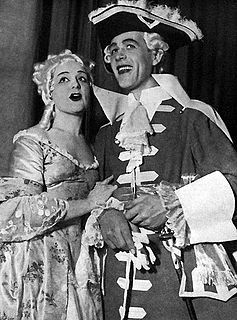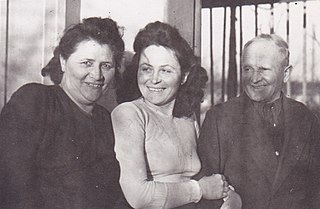Sources
| General | |
|---|---|
| National libraries | |
| Scientific databases | |
| Other | |
Karl Terkal (7 October 1919 - 12 August 1996) was an Austrian operatic tenor, particularly associated with lyric roles of the German repertory, both opera and operetta.
Born in Vienna, Terkal was working as a furniture carpenter in Vienna, while taking voice lessons with Valerie Wilhelm. He later entered the Vienna Music Academy, where he was a pupil of Hermann Gallos. He made his stage debut in Graz, as Don Ottavio, in 1950, and remained there until 1952. He made his debut at the Vienna State Opera in 1951, again as Don Ottavio, under Clemens Krauss, and began a long association with that theatre that would last some thirty years. He also sang frequently at the Vienna Volksoper, where he became a great favorite in operetta. He was also a guest at the Bregenz Festival and Salzburg Festival.
He also made appearances in London, Rome, Milan, Naples, Palermo, Lisbon, etc. He excelled in lyric parts in opera by Mozart, Wagner, Strauss, Verdi and Puccini, as well as operetta by Johann Strauss, Franz Lehár, etc.

Walter Berry was an Austrian lyric bass-baritone who enjoyed a prominent career in opera. He has been cited as one of several exemplary operatic bass-baritones of his era.

Clemens Heinrich Krauss was an Austrian conductor and opera impresario, particularly associated with the music of Richard Strauss, Johann Strauss and Richard Wagner.

Hilde Güden was an Austrian soprano who was one of the most appreciated Straussian and Mozartian sopranos of her day. Her youthful and lively interpretations made her an ideal interpreter of roles such as Zerbinetta in Ariadne auf Naxos and Susanna in Le nozze di Figaro.
Ludwig Weber was an Austrian bass.
Gustav Neidlinger was a German bass-baritone most famous as the pre-eminent leading performer of Wagner's "howling-and-spitting" villains, especially Alberich and Klingsor, from the early 1950s to the early 1970s. Born in Mainz, Neidlinger studied at the Frankfurt conservatory, where he was trained by Otto Rottsieper. He debuted in 1931 at the Stadttheater in Mainz, where he sang until 1934. In 1934 and 1935, he performed at the Stadttheater in Plauen, Sachsen. From 1935 to 1950, he was a member of the Hamburg opera, where In 1937 he took part in the world premiere of the opera Schwarzer Peter by Norbert Schultze. In 1950, he joined the Stuttgart Staatsoper, where he became very popular and was, in 1977, named an honorary member. In Stuttgart, he sang in Igor Stravinsky's The Rake's Progress. In 1956 he moved to the Vienna Staatsoper, where he had sung as early as 1941. He also sang at the Paris Opéra (1953–67) and at Covent Garden in London in tandem with the Stuttgart ensemble. He was honored with the title German Kammersänger in 1952.
Torsten Ralf was a Swedish operatic tenor, particularly associated with Wagner and Strauss roles, one of the leading dramatic tenors/heldentenors of the inter-war period.
Alois Pernerstorfer was an Austrian bass-baritone
Murray Dickie OBE was a Scottish tenor opera singer and director, who established his career in England, Austria and Italy during the 1950s. In addition to his extensive stage work he was a prolific recording artist.
Trude Eipperle was a German operatic soprano.
Hans Hopf was a German operatic tenor, one of the leading heldentenors of the immediate postwar period. He sang Walther von Stolzing in the Bayreuth Festival's Die Meistersinger, in 1951 and again in 1952. He would also sing Siegfried at Bayreuth from 1960–1963.

Wilma Lipp was an Austrian operatic soprano and academic voice teacher. A long-time member of the Vienna State Opera, she was particularly associated with the role of the Queen of the Night in Mozart's Die Zauberflöte, a role she performed internationally more than 400 times. She was awarded the title Kammersängerin at age 28, and was an honorary member of the Vienna State Opera, among other honours.
Hildegard Ranczak was a Bohemian operatic soprano, particularly associated with Richard Strauss roles, and largely based in Germany. She married and later divorced German baritone Fritz Schaetzler.
Franz Fehringer was a German operatic tenor, particularly associated with light lyric roles in the German, Italian, and French repertories.

Ira Malaniuk was an Austrian operatic contralto of Ukrainian descent. She sang a wide range of roles, from Mozart to contemporary works.
Helmut Krebs was a distinguished German tenor in opera and concert, who sang a wide range of roles from Baroque to contemporary works.
Georgine von Milinkovič was a Croatian operatic mezzo-soprano of Czech birth, particularly associated with Wagner and Strauss roles.

Hugo Hasslo was a Swedish operatic baritone.
Esther Réthy was a Hungarian operatic soprano who had a major career in Europe from 1934 through 1968. She was notably a principal artist at the Vienna State Opera for over a decade and was a frequent performer at the Salzburg Festival. She performed a broad opera repertoire that encompassed French, German, Italian, Czech, and Hungarian operas. The latter part of her career was dedicated mainly to performing the German operetta literature at the Vienna Volksoper. A very beautiful woman, she was a greatly admired Angele in Richard Heuberger’s Der Opernball.

Anny Felbermayer was an Austrian soprano in opera and concert. The lyric soprano was a long-term member of the Vienna State Opera. She appeared in many operas by Richard Strauss, including the premiere of his Die Liebe der Danae at the Salzburg Festival in 1952.

Alfred Jerger was an Austrian operatic bass-baritone, who began his career as a conductor of operettas, and was also an interim director of the Vienna State Opera and a professor of the Vienna Music Academy. He appeared at the Salzburg Festival from 1922 to 1959, and created the leading role of Mandryka in Arabella by Richard Strauss, among others.